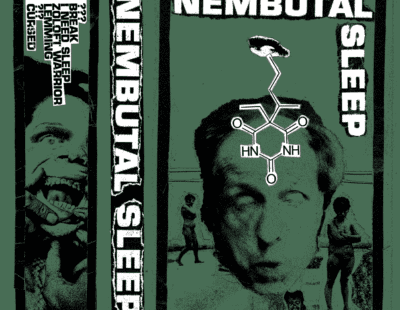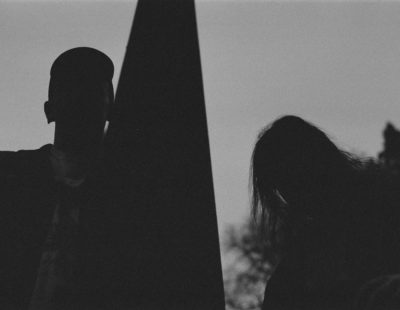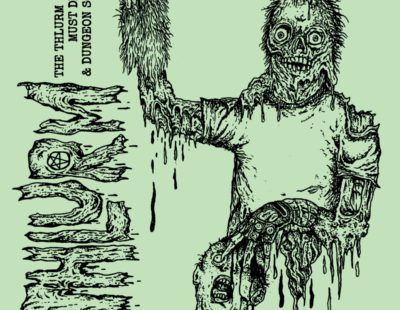

Dratna is the work of Antard, a man living in Belfast, Northern Ireland. This time, we’re covering two demos at once as both Clíodhna and Altar were released this year, and both are extraordinary demonstrations of atypical black metal. This also is one of those rare Demo:listens in which the Q&A-style interview reads so well that it works best presented in full. Enjoy . . .
So you go by Antard. That’s a pseudonym, right?
Antard is what people who know me call me. I use my real name for my photography business, which is how I make a living. I have built up a good career here in Northern Ireland. The music is something I do for pure pleasure. Not too many people who know me know that I do this. I like the anonymity of it.
What is the significance of the name Dratna, and how did you arrive at it?
You know the old myth that if you play certain records backwards you can hear secret messages? If you play ‘Stairway to Heaven’ backwards you can hear Satan? Well, it’s basically a play on that idea. Dratna, spelled backwards, is… And therein lies the big secret. It works, though, so I stuck with it. Although in the words of the late Bill Hicks, “If you play records backwards, you are Satan.”
What made you want to play black metal in the first place? Were you planning to form a band, or did you always want to go it alone?
Before I recorded Clíodhna (Pronounced KLEE-uh-NA) I hadn’t picked up a guitar in at least 13 years. I didn’t even know if I could still play the thing, never mind play black metal. When I was in my teens it was all Metallica, Slayer and punk music. Life got in the way of things so the guitar and the dream of being in a huge successful metal band got pushed to one side, although my musical taste got heavier and more extreme. As soon as I started getting into black metal I knew this was where I was always supposed to be. I remember Phil Anselmo on a Superjoint Ritual DVD saying something along the lines of, ‘the pulse of heavy metal lies in the underground. That’s where true heavy metal lies.’ That stuck with me. I wanted to be in the underground, away from the mainstream.
Dratna just kind of happened and is very much unplanned. I had initially planned to do the music then hire in a vocalist. The problem with having someone else sing on it was trying to find a singer. I know a lot of metalheads but very few who are into the black metal scene, so it was even harder to find someone who can sing in that style. Then I thought about the likes of Evilfeast, whose Elegies of Stellar Winds is probably, in my humble opinion, one of the best black metal albums ever written. That inspired me to go it alone. Fenriz of Darkthrone describes black metal as ‘individualism above all’. Black metal allows you to be an individual, and it shows by the number of one man bands in the scene. I’m also way too impatient to wait around for other people to get their shit together.

Tell me about your unconventional band logo, please.
The logo is actually letters from an primitive Irish language called Ogham. It spells out Dratna, but when you read Ogham you read it from bottom to top, so again it spells out Antard.
Have you played in any other bands before Dratna?
Yes, in my teenage years and early 20s. It was all about music, partying and drinking! Growing up in Northern Ireland wasn’t easy, surrounded by the religious and political divides. It’s so fucking stupid too. There wasn’t much to do, so we all took up drinking. Maybe it sounds a bit clichéd that an Irish person drinks, but we were all underage drinking, and by the time you hit the legal age to start drinking at 18, you’re a seasoned pro. I drink a lot less these days and I’m way more productive. Drinking and music was an escape from the norm for us. You were either in band, or played the turntables — we embraced it all. Spent half our teenage years on the mountain, partying the night away. It helped us grow as individuals and learn to accept one another. Northern Ireland is a beautiful country led by bitter people. That toxicity affects you without you realising it. Religion has poisoned Ireland — stolen its pagan heritage and culture — and that’s why I wanted to produce Clíodhna.
The good news is that religion is slowly dying out. In the south of Ireland, where Catholicism was once the be-all and end-all, people are starting to reject its teachings. Years of abuse and scandals have left the Church’s reputation in tatters. People no longer trust it. The lyrics on Altar have a lot to do with the Church in Ireland. Ireland has a lot of similarities to Norway and Scandinavia — where I live it even looks like Norway and Scandinavia. Ireland can be a very rural and isolated place; the landscapes are unreal, and it’s a great place to seek inspiration for a black metal band.
So we’re gonna cover two demos at once for the first time on Demo:listen. How soon before recording and releasing them did you write these two demos? Care to give a rough timeline?
Clíodhna was about a four-month process, on and off, from December 2017 to March 2018. Altar was written, recorded and released within two months. I really hammered it home quickly, but wasn’t rushed. The music is starting to flow more naturally.
How was the recording process for Clíodhna? Did you learn things to make the process for Altar easier?
Clíodhna was a complete learning process. Not just in recording, but in learning how to play black metal. I’m pretty good at winging it and that’s exactly how Clíodhna went down. Both EPs were recorded on GarageBand in my home office while my wife worked night duty. It’s home recording at its most basic. There’s no fancy equipment or producers. I would put metronome on and play into GarageBand until I had the riff nailed down. All the guitars were done first, and then I’d go back and add the drums.
I learnt a lot from recording Clíodhna. When it came to write and record Altar, it was a much more refined process. From listening to Clíodhna I made a lot of mental notes about what I would do differently. The music of Dratna isn’t that complicated, either. I like to keep it simple. (That’s just my shitty excuse for sucking at guitar!)
Clíodhna is slightly more lo-fi and closer to a second wave Norwegian BM sound. But on Altar, everything seems more restrained in a psychotic killer sort of way. I get a THORNS vibe from it. What’s going on here, thematically, between the two albums? How are they similar, these two demos, and how are they different?
I love Thorns. They’ve actually been quite a big influence on my style. One song in particular: ‘Stellar Mass Elite’. I love a good chugging riff, and that song bangs hard. I’m a constant nodder when listening to music at my desk. I wanted that to come across in my own music. I want something you can bang that head to.
The beauty of black metal is that it doesn’t need to be polished. The lo-fi production can be a little rough, and that suited me down to the ground. I loved the way Burzum recorded his vocals through a shitty pair of headphones. I just used a basic mic, and let loose. My guitar playing on Clíodhna is rough, but I was just happy to be recording.
The similarities are the song structures. I use a lot of melodies and guitar licks. They’re heavily layered, too. I also like to have quite repetitive lyrics and riffs. This is definitely something that will continue within Dratna. I think both records have a certain groove to them. Both have artwork that are photographs taken in the Mourne Mountains in County Down, where I live.
The concept of Clíodhna is all about Irish mythology, but there lots of bands doing this in Ireland and much better than Dratna. So early on, I wanted to step away from this as a running theme. I didn’t want to limit what I could do by writing only about mythological Ireland. I like the freedom to write about everything. I think I will revisit the mythological theme at some point. I have a lot more exploring to do there myself.
What conscious decisions were made on your part to distinguish these two releases?
From the outset, the production on Altar was gonna be stepped up a notch. I listened to Clíodhna over and over to see what I would do differently. I wanted the drums to be more aggressive and tight. I wanted it to feel more like a whole band rather than a one-man band. I felt that Altar needed to be heavier than Clíodhna both lyrically and musically. The vocals on Clíodhna are not as tight as they are on Altar, but I can really feel my vocal ability growing as I produce more music.
Lyrically, Clíodhna is very much my attempt at re-learning my Irish folklore. All the names and characters on Clíodhna are from Irish folklore. Altar has more religious overtones. It’s probably a bit of a typical theme, but it hits home and has meaning here in Ireland.
How did these demos end up surprising you?
The fact that they have seen the light of day is my biggest surprise. I’m totally blown away by some of the reviews and people who have contacted me from around the world. There’s a small fanbase developing and it’s really cool that it even exists. When Dratna started out I never thought I’d finish one EP, never mind two in one year. It’s a good feeling.
Is anyone else involved in any process of Dratna besides yourself? Like, does someone else do your layouts, or your mastering — or is it all you? If so, why do you prefer such reclusive circumstances for creating your music?
I do everything myself, from making the artwork to production and self-promotion. On Altar I had a friend, Skip Rodgers, who writes some pretty cool dark poetry. He wrote some poems out for me which then influenced my lyrical direction on Altar.
I am a very self-driven person, and that’s really important if you want to go it alone. The simple reason is that I love making music. I have found my old passion and love doing the drums, guitars, synths, the vocals and producing. You start out with a riff and then the next thing you have a seven-minute monster on your hands! It’s very therapeutic, writing and recording, and it gives me joy to be able to do it. Feel I’m on the right path when I’m being creative, I do it for myself.
“Tuatha De Danann” is an assassin of an upbeat banger. What possessed you to write this song and did you know it was your opener immediately upon finishing it?
Yes! You know the opening to The Great Southern Trendkill? That record is the heaviest-sounding record of all time. That opener, where Phil screams and the band pummels the shit out of their instruments. Amazing! I wanted my own Great Southern Trendkill opener. I want to get into it straight away, so the listener knows what’s ahead of them. It sets the tone for the record.
What’s happening from like 01:48 to like 02:25 in “Silent Frost?” What’re you saying there, repetitively? Where comes the inspiration for this song? I love the gothic synthy middle part.
“This my killer! This my killer! This my killer!” ‘Silent Frost’ is about the Church and the evil that lurks within it. It’s hidden, cold, calculated and misleading. It was forced upon the people of Ireland and many other countries around the world. That is not to say that its followers are evil — it’s more about how evil lurks within. It’s about discovering that and trying to free yourself from its grip.
The title track for your first demo leads me to believe Bathory is a major influence. Sounds like you know your way around the NWOBHM era, too. But I’m hearing something unexpected, too. Something outside the realm of metal. Who are some of your non-metal influences?
NWOBHM has had a massive influence on me. It was the first style of heavy metal I was into, but I listen to everything. I fucking love music. I grew up listening to all the stuff my dad was listening to. Pink Floyd, The Beatles, Dire Straits, Fleetwood Mac: all these great guitar bands. I was a child of the 80s, so I have this weird obsession with 80s pop music. And I mean the cheesy 80s pop hits like ‘Mr Roboto’ by Styx, ‘Land Down Under’ by Men at Work, ‘Africa’ by Toto. ‘Everybody Wants to Rule the World’ by Tears For Fears is probably one of my all-time favourite tracks! I connect with 80s music on an emotional level. It’s a nice feeling, that you can be happy and listen to music. Just like black metal, it makes the hairs on my neck stand up. While answering these questions I’ve been listening to Invisible Touch by Genesis. And before that, the new Immortal album.
Over the last year, musically, my biggest non-metal influence and the reason Dratna exists is Tom Petty. I never really knew much about Tom Petty until after he died. I watched his film, Running Down a Dream last December. The next day I went to Belfast and bought a guitar and amp. He’s the reason I picked up the guitar after 13 years and started playing music. Dratna would not exist if it wasn’t for the death of Tom Petty. I dedicate Clíodhna to his memory. That man was a legend. I’m not afraid to listen to other forms of music or be inspired by them. I can’t stand the pigeonhole that someone in metal must only listen to metal. Pink Floyd would be my all-time favourite band.
“Lir” is a catchy track that reminds me of something from the first Gehenna album. What story are you telling here on this song?
‘The Children of Lir’ is a popular Irish myth which I remember from my childhood. Lir is the god of the sea. His wife dies, and he then remarries a woman who gets jealous of her new husband’s kids. She casts a spell on the children for 900 years turning them into swans, and Lir gets pissed off and banishes her to the mist.
How come the lyrics for Altar are in English, but the first demo is in Gaelic? What language is that exactly? How did you come to know it?
Only the titles and names on Clíodhna are in Gaelic. The rest of the lyrics are in English. It’s the annoying thing about being Irish; that we all speak English as our first language. In a way it’s just me trying to be ‘a better Irish person’, and learning more about my roots. The old stories and folklore are really interesting. When you stand in the Irish countryside you can almost feel a mythical presence at times. Gaelic is the original language of the Irish people. It’s spoken by a minority of people here now, but it’s making a comeback.
“De Domnaigh” is brilliant, man. That’s all I gotta say. Well done on that song, dude.
Thank you. This was the first song that I wrote for Clíodhna. I played that main riff over and over while trying to learn black metal. I then went all White Zombie on it and introduced the synths and the long intro. ‘Dé Domhnaigh’ means ‘on Sunday’. That’s how I wrote Clíodhna. I would dedicate a few hours every Sunday to learning black metal and recording.
Altar seems overall more punk and aggressive than Clíodhna. Would you agree with this?
It’s definitely more on the aggressive side of things. I’ve always had this punk influence in the background. I was very much into punk when I first picked up the guitar. It was the first style of music I learned to play, and I suppose subconsciously it’s engraved into my playing.
Will these demos ever seen a physical manifestation?
I was thinking about this the other day, and at some point in the future, yes, it’s something I’d like to get around to. But for now I’m happy with the digital output.
What’s next for Dratna?
Writing the first full-length album. Ideally this is where I would love to open the doors of Dratna to work with a producer, label and distribution company and get the music out there. But whether someone else is on board or not, there will be a full-length album in 2019. The ideas and concepts are already working in my head. I have more time in the winter. I plan to be writing and recording in December once more. In the future I’d very much like to do a Dratna live show with a full band.
Awesome, man! Great work on these demos. Seriously, they’re beasts and I’m looking forward to getting to know them better.
Thank you, it has been really nice doing this interview and I am really grateful for the opportunity.






